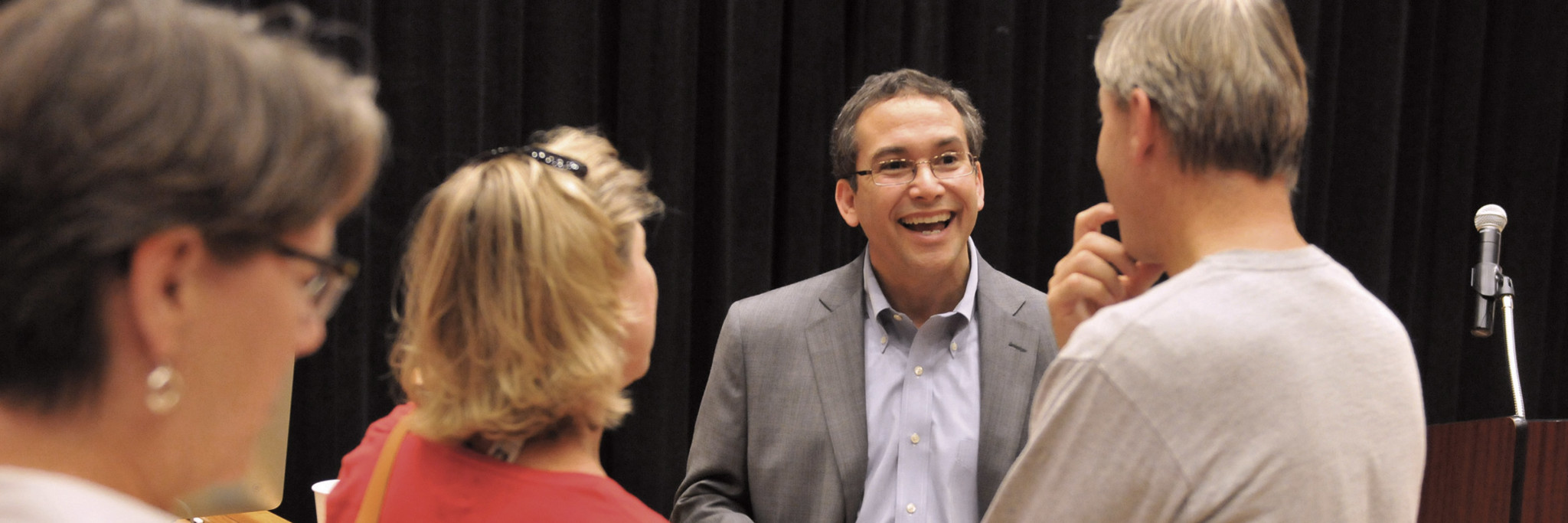In my first few months, I have been impressed with the health of Denison. We have outstanding students, committed faculty, talented staff, a beautiful campus, an exciting curriculum, and a healthy balance sheet. We should all be proud of Denison.
Our strength comes from the kinds of people who choose Denison and the enduring relationships that are formed on this hill. Simply put, Denison is all about the people, and there is a DNA to a Denison person. It starts with our faculty who mentor in the deepest sense of the word. They engage our students in their offices, laboratories, stages, studios, and throughout the community. If one ranked colleges by the commitment of a faculty to its students, Denison would be at the very top of the list.
Of course, at Denison mentorship goes way beyond the academic context. It takes place in athletics, arts performances and exhibitions, student organizations, work-study jobs, and residential halls. It happens peer-to-peer, as students create a community and then challenge each other to find ways to contribute.
This is a formidable moment for higher education. Our financial model is being questioned for its cost and return on investment. Technology, internationalization, and research on the science of learning are opening up new opportunities and possibilities. We also find ourselves being challenged on the civic front by local communities that need us to do more. Denison is positioned to lead the way in helping the larger higher education community deal with current challenges and opportunities.
As I listen to our faculty, staff, alumni, parents, and students, I believe we must address these concerns by taking a few focused steps to raise our visibility, deepen student learning, and ensure the post-college success of our students.
First, we need to raise our visibility. There is a Midwestern humility to Denison that I love. But we need to take care that our humility does not get in the way of letting the higher education community know just how strong and interesting we are.
Second, we need to deepen student learning. During my initial weeks at Denison, I have been struck by the energy, creativity, and passions of our faculty. At Denison, every interaction matters. Our faculty are exploring ideas for creating even more mentorship moments by expanding on our strengths in undergraduate research, team teaching, project-based work, off-campus excursions, and other forms of active learning.
Another exciting development involves our innovative residential education model. We are creating an entrepreneurial campus culture, where students are challenged to become problem-solvers and architects of their own Denison experience. A college campus should be a series of “design studios” or spaces where students come together to invent and remix knowledge and approaches. This is happening at Denison as we capture all the learning that takes place in student organizations, athletic teams, arts organizations, and residential halls.
Finally, we need to ensure that our students succeed after they leave Denison by helping their transition into professions and careers. Our students are smart, multitalented, engaged, passionate, and socially adept. They should do well in a competitive job market, but we must do more to help them. Across the four years, we need to help students ask questions about the lives they want to lead, and how careers fit into those lives. We must challenge and sharpen our students’ skills. We need to use the time between semesters for internships, externships, and profession-specific seminars. And we should continually build runways for our students into their chosen professions.
We need to do all of this while paying careful attention to changes in the external environment and refining our financial model accordingly. Some of these challenges will come as expense pressure, including rising costs of information technology, governmental regulation, and healthcare. Other challenges will come from revenue constraints, including price-conscious families and the effect of uncertain financial markets on Denison’s endowment.
I love our mission statement, which reads, “Our purpose is to inspire and educate our students to become autonomous thinkers, discerning moral agents and active citizens of a democratic society.” But most of all, I love the way we live and build upon our mission statement every day.

